In this article, we interview Dave Flock and the Flock Family from Flocks Mini Aussies in Otis Orchards, Washington. Years ago when we opened Valor K9 Academy in Spokane, the Flocks reached out. They were excited about having a reputable trainer at their disposal for their clients and wanted to meet us in person before recommending us. (We love that!) Over the years we’ve had the privilege of working with close to a dozen of their dogs. And they’ve all been consistently wonderful! Get to know Flocks and their fabulous breeding program in our fun and informative Q&A below!
1- What made you decide to breed Toy and Miniature Australian Shepherds instead of Standard Australian Shepherds?
We loved the Australian Shepherd as a breed (their family loyalty, willingness to please, their smart mind etc.) but wanted to have a smaller version that our kids could handle easier for 4H and shows and that could travel easier because of their size. Breeding came later after falling in love with our first girl, and meeting the right people that helped us get started.
2- Besides size, is there any difference between Toy Aussies and Mini Aussies?
In general we breed for the smaller Mini Aussie, but in doing so will get a Toy. Honestly in our opinion, the Toy should only show difference in size. They should act like their larger cousin, and be able to show breed heritage. They obviously are smaller and so can’t technically cover the large area as fast, but their willingness to do the job of herding or hiking or whatever task put before them should be there no matter the size.
3- How many litters do you have per year? How long is your wait list?
On average we may have 3-5 litters per year, depending on our girls.
We do things a bit different than average, we don’t keep a formal wait list. We wait until puppies are born and are a week or two old to have people place a deposit. This allows for us to have time to get to know potential homes so we can make sure puppies would be a good match and then they are also placing their deposit money towards a puppy they can see. We of course give preference to people who have taken the time to contact us first. Although our pups are never first come first serve.
4- What are your goals as a breeder?
We obviously have the desire to better our breed with every litter. We strive for healthy dogs with level temperaments and good structure and keeping with breed standard. We also want to be available for breeder support during the process of buying the puppy to make sure it is a fun experience as this puppy is going to be a family member for many years to come, but also make sure we are a support for them through the lifetime of their puppy if needed.
5- What is something people sometimes don’t consider when it comes to Mini Aussies as a breed?
I think sometimes people see the word mini/toy and think of a dog that wants to sit in your lap and be pampered. Although they have times they will do that, this is not a breed that has to be babied, they aren’t afraid to go out and get dirty and wet. That mud puddle, leaf pile, snow bank, or even the sprinklers is their idea of fun.
6- What types of temperament traits do you breed for and why? Which traits do you avoid?
We call it a level temperament, for our breed this means a dog that is trustworthy, never aggressive. We want them to be versatile and adaptable to most situations. By nature most can be reserved with strangers and that is ok but we don’t want them to be afraid of strangers. We try to breed for the well-rounded family dog.
In order to avoid undesirable traits, we have to do our homework, and keep logs of our breedings and any trait like anxiety, aggression, shyness, fearfulness, overly hyper would then be taken into account. These are traits we want to avoid.
7- Let’s talk about health testing. Can you tell us about each test you do and why you do it?
DNA testings is so important to breeding, some people feel if their dogs looks and acts healthy then they are ok to breed. This is not the case, they could be a carrier of a disease without having the disease, and if bred to a dog who has the disease then the offspring will be affected. Most tests have to do with the eyes, which they are prone to having the most problems with.
Here are the testing most used in our program.
CEA(Collie Eye Anomaly)- this is where the Choroid tissue of the eye is thinner in dogs with the disease. This tissue is responsible for supplying blood to the retina, if not healthy then it could cause the retina to detach which may cause blindness.
PRA/PRD (Progress rod-cone degeneration) – this is disease that you wouldn’t even know your dog has it till later in life at around 3-5 years old. It causes night blindness and peripheral vision loss at first which eventually leads to full blindness as it affects the rod and cone cells of the retina.
MDR1(Multi drug sensitivity) – This is responsible for the sensitivity to many drug used every day in dogs. Certain wormers like Ivermectin and Loperamide. (There are many others on this list as well). Dog will have a reaction to these that can cause seizures, neurological symptoms, and even death.
******It should also be said that with our dogs even when testing NEGATIVE for this, we still are aware of the drugs and DON”T take any chances by allowing them to be given these, because high doses of these drug can still cause unwanted effects.We avoid putting our dogs at risk! There are always safer alternatives.
CMR1(Canine multifocal Retinopathy)- this eye disease can cause lesions on the retina which will affect the vision and will alter the appearance of the eye. It can also cause constant eye discomfort.
HC(Hereditary cataracts)- This causes the same in dogs as in people that causes the lens to be cloudy and blurred vision in one or both eyes. It can happen even in young dogs and can cause blindness as they age.
DM (Degenerative Myelopathy)- this is a disease of the spinal cord that usually affects dogs as they age. It gives them loss of coordination in the hind limbs, wobble when walking or knuckle over. As this disease gets worse, they will not be able to stand and may become paraplegic.
HU (Hyperuricosuria)- This particular test is one we just recently added to our program. Many people may not see the value, but we have seen firsthand what this can do to a young dog. This disease can cause high excretion of uric acid leading to urinary stones. They can cause bladder blockage and can cause urinary incontinence. All this can lead to Kidney failure. Even with surgery, to remove the stones, there is no guarantee to if they will return.
8- Do you ever have dogs returned to you? What happens to them?
We have a statement in our contracts that people sign when buying our puppy, that if for any reason at any time they cannot keep our puppy/dog we will be contacted first. Yes, we have had a few dogs returned for various reasons. We understand life sometime changes for families and so we as a breeder feel it is our job to be responsible for our dogs/puppies and take them back and then find another suitable home for them. We have many resources and we make sure families know this, so that none of our dogs ever have to end up contributing to the shelters population.
9- You’re a big advocate for training. Why?
For any breed this is a great way to create a strong bond with your puppy, and to start off with good ground rules. But because Aussies (of any size) are so smart and want to please, this is a wonderful way of keeping their mind and body satisfied. Finding the right trainer is also important, not all training is created equal. Improper training can create a dog that is not easy to manage.

Gretty from Flocks trained with Valor K9 Academy. She belongs to VK9 Stay and Play Hosts, Lex and Dana
We do our best to give our pups the best start as possible, with socialization and raising them in our house around all the things of a regular household. Our kids are a big part of this as well, we want to have this continued as they transition to another home. So we always highly suggest training as a way to keep what we started.
10- Tell us about double merles. What do you do to prevent double merles in your breeding program?
Double Merles (or sometimes called lethal whites). Is when 2 merle patterned dogs are bred together. Every pup in the litter has a chance of getting the double “M” gene. This causes an excessive amount of white on a dog, causing deafness in one or both ears, also causing eye defects that can be serious and most the time blinding.

Henry is a double merle Aussie from an irresponsible backyard breeder who was rescued by Double J Dog Ranch
Many people see an ALL white aussie pup with blue eyes and think “wow gorgeous” but in reality the pup probably has many genetic and health issues that will cause difficulties for it to live a normal life
As a breeder we are very selective on our breeding dogs, and NEVER breed 2 merles together. We also only keep tri colored (non merle) boys in our home. Any Merle boy we keep for our breeding program goes to a select guardian home which raises them. As to avoid any accidental breeding between our dogs.
There are times where more white on pups can show up, even when selective and careful breeding happens. This is where we as a breeder then make adjustments and know which dogs should not be bred together.
11- Is there anything else you’d like to tell us about Flocks Mini Aussies?
We are truly blessed to be a part of this wonderful breed. We are all about our Faith, Family and Furry Friends. Our kids get to be a part of this journey with us and have learned many lessons on kindness and dedication and pure love from a dog. They have learned sorrow and loss from a dog. They have laughter and pure joy from a dog. They get to be comforted and kissed on from a dog. Our dogs are not just used for breeding, they are so much more to us than that!
A big THANK YOU to the Flocks for the time in completing this interview and for sharing their knowledge and passion for breeding our beloved Mini Aussies! We have loved partnering with them over the past six years and have nothing but good things to say about their dogs that we’ve worked with. All confident, social and motivated pups who do great things like Service Work and Therapy Work as well as being awesome Family Companions.
If you’d like to contact Flocks, please check out their website at http://www.flocksminiaussies.com/ and look for them on Facebook at https://www.facebook.com/Flocks-Mini-Aussies-1486161961661429
Photos courtesy of Flocks Mini Aussies. Photos of Henry and Gretty by Valor K9 Academy.
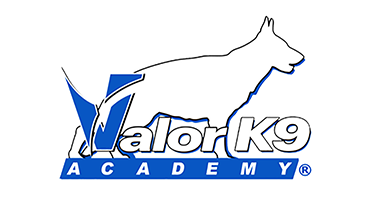
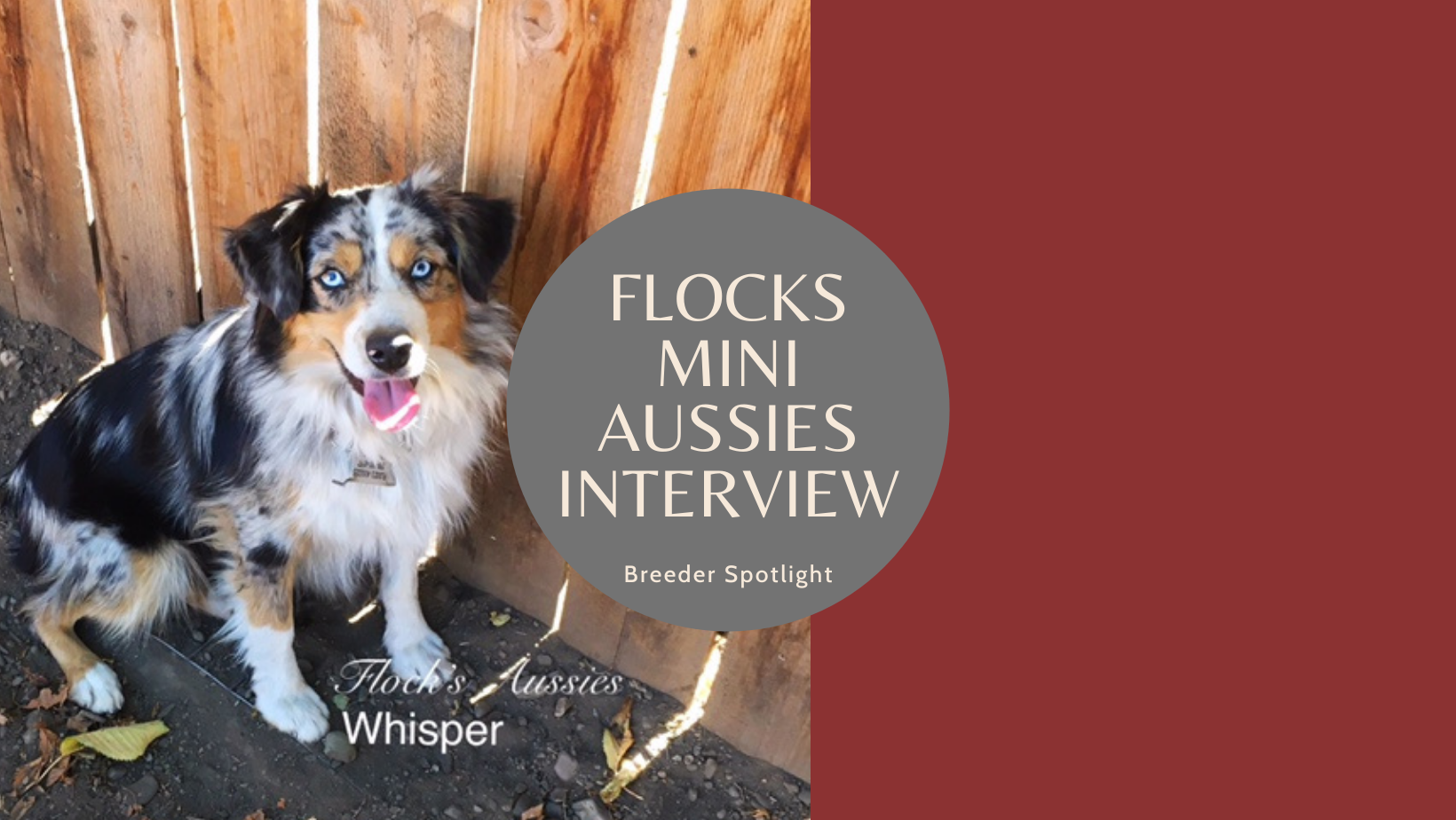









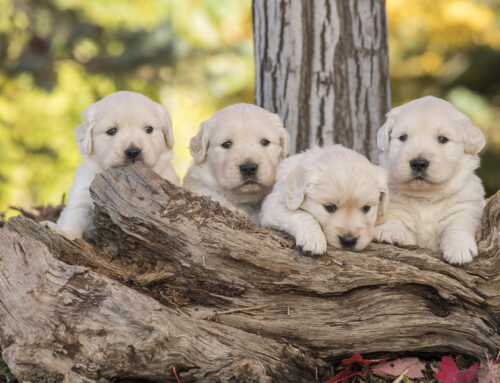
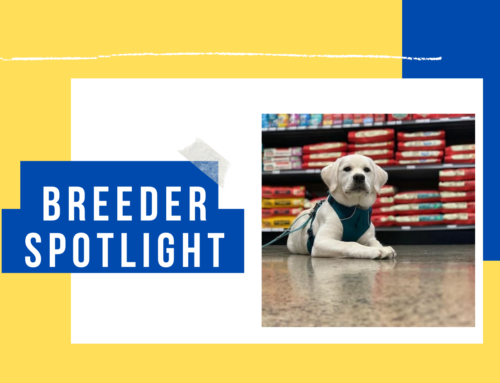
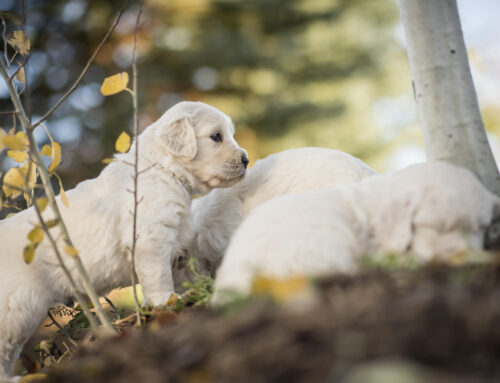
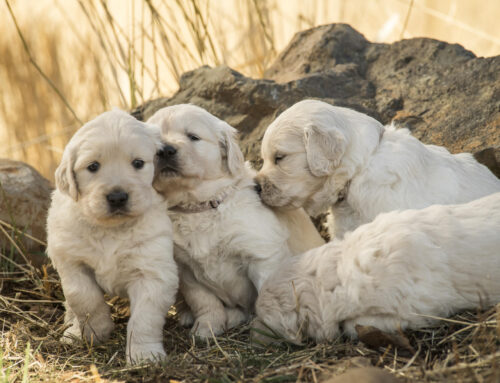
Leave A Comment